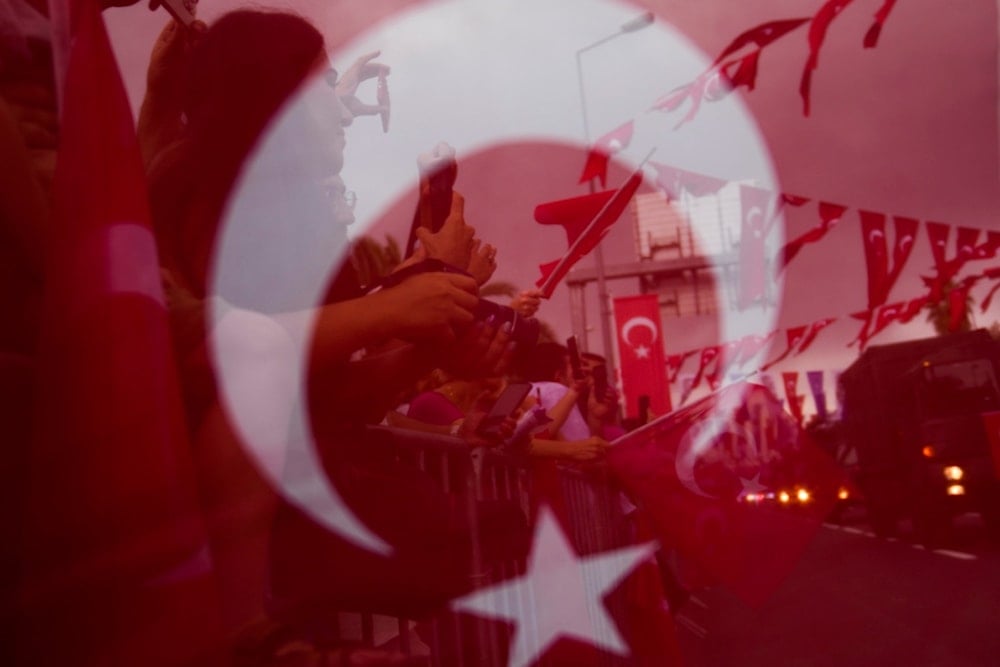Bid to join BRICS aimed at expanding alliances beyond West: Erdogan
Erdogan's ruling Justice and Development Party has frequently accused Western nations of obstructing Turkey's aspirations for a self-sufficient defense industry and a robust economy.
-

People watch Turkey's Forces parade for Victory Day, in Istanbul, Friday, Aug. 30, 2024. (AP)
During a speech in Istanbul on Sunday, Turkish President Recep Tayyip Erdogan discussed the prospect of Turkey becoming a "strong, prosperous, prestigious, and effective country if it improves its relations with the East and the West simultaneously," adding: "Any method other than this will not benefit Turkey, but will harm it."
These remarks come in light of recent revelations that Turkey has applied to join the BRICS organization, a move that reflects Ankara's desire to expand its global influence and diversify its alliances beyond traditional Western partners.
Sources informed Bloomberg that Turkey submitted its application to join BRICS several months ago. This decision is seen as part of a broader strategy by Erdogan's administration, which perceives the geopolitical center of gravity as shifting away from developed economies. The application was made amid ongoing frustrations over the lack of progress in Turkey's decades-old bid to join the EU and growing rifts with NATO allies due to Turkey's decision to maintain close ties with Russia amid the war with Ukraine. Both Turkey’s foreign ministry and presidency have declined to comment on the application.
Read more: Turkey's BRICS membership 'inevitable' despite US pressure: Opposition
BRICS, an acronym for Brazil, Russia, India, China, and South Africa, represents some of the world’s most significant emerging economies. At the start of this year, the group expanded to include Iran, the UAE, Ethiopia, and Egypt. Saudi Arabia has also been invited to join but has yet to accept.
Further discussions on BRICS expansion are expected at a summit in Kazan, Russia, from October 22-24. Countries like Malaysia, Thailand, and Azerbaijan are also reportedly interested in joining.
The BRICS bloc promotes itself as an alternative to Western-dominated institutions such as the World Bank and IMF. For new members, joining BRICS could mean access to financing through its development bank and the opportunity to broaden their political and trading relationships.
Facing a Dilemma?
Erdogan's ruling Justice and Development Party has frequently accused Western nations of obstructing Turkey's aspirations for a self-sufficient defense industry and a robust economy. Erdogan has consistently called for reforms to the UN Security Council to include more nations beyond the current five permanent members and has shown interest in joining the Shanghai Cooperation Organization (SCO), established by Russia and China as a counterbalance to NATO.
"We do not have to choose between the EU and the SCO as some people claim," Erdogan said. "On the contrary, we have to develop our relations with both these and other organizations on a win-win basis."
China has been a key driver of BRICS expansion, aiming to enhance its global influence by engaging countries traditionally aligned with the United States. Turkey views BRICS membership as an opportunity to improve economic cooperation with Russia and China and position itself as a trade conduit between the EU and Asia. The country also seeks to become a hub for gas exports from Russia and Central Asia.
Read more: Turkey's potential BRICS accession to enhance bloc's operations
In recent months, Erdogan's government has been actively courting investment from Chinese electric vehicle manufacturers, who could leverage Turkey's customs union with the EU to expand their market access.
"BRICS is an organization that increases the diversity of approaches, identities, and politics in the global economic system," Turkey’s Foreign Minister Hakan Fidan said after attending a BRICS foreign ministers meeting in June.
Despite its bid for BRICS membership, Turkey is also making efforts to rejuvenate its EU membership talks. Fidan recently reiterated that joining the EU remains "a strategic target" after attending informal talks with EU counterparts for the first time in five years.

 4 Min Read
4 Min Read








